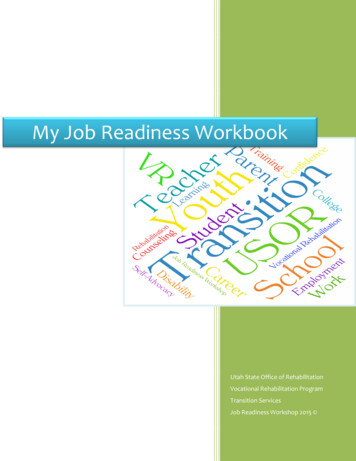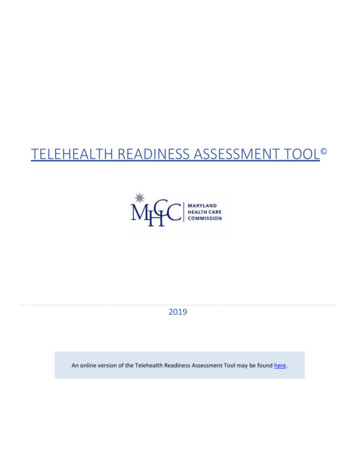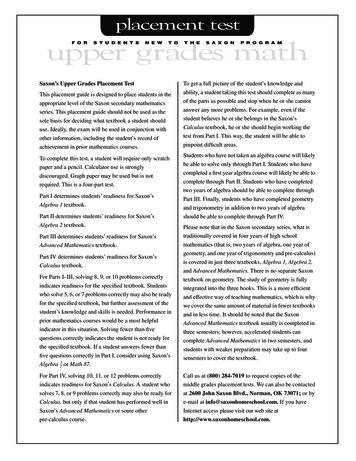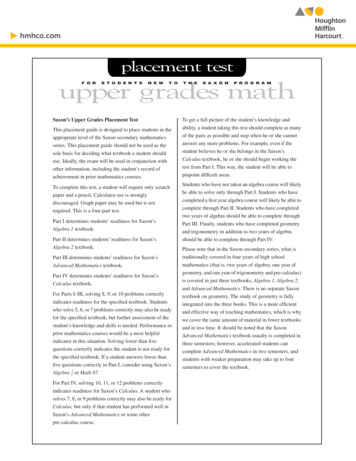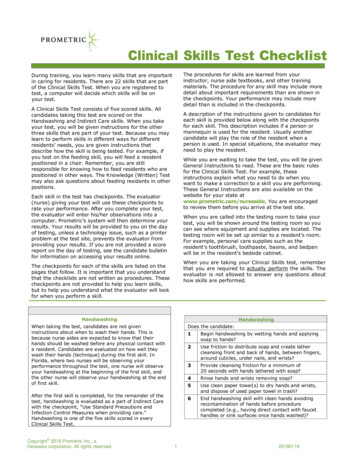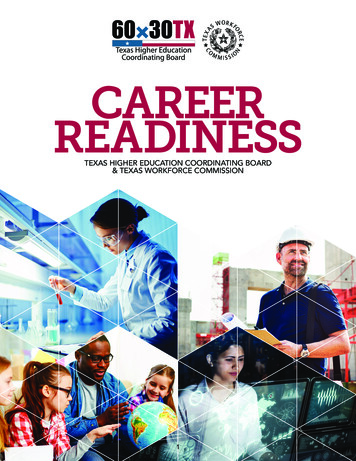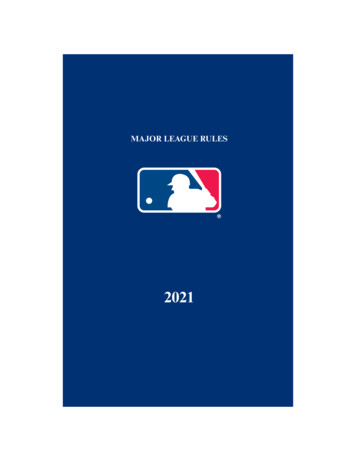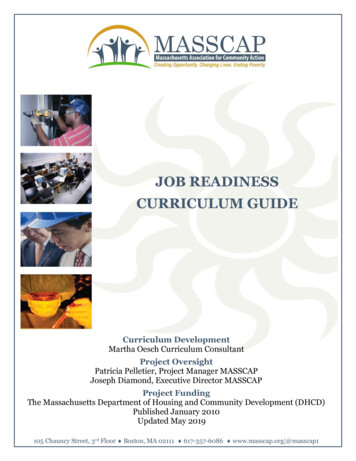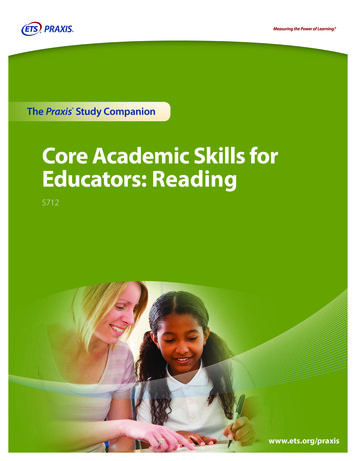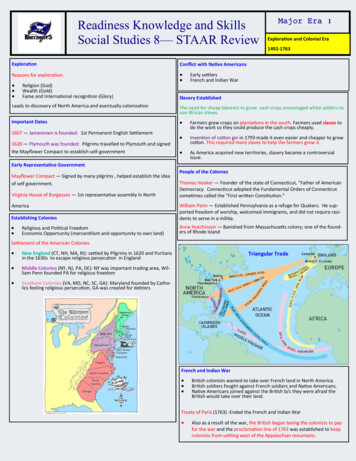
Transcription
Readiness Knowledge and SkillsSocial Studies 8— STAAR ReviewExplorationConflict with Native AmericansReasons for exploration: Religion (God)Wealth (Gold)Fame and International recognition (Glory)Major Era 1Exploration and Colonial Era1492-1763Early settlersFrench and Indian WarSlavery EstablishedLeads to discovery of North America and eventually colonizationThe need for cheap laborers to grow cash crops encouraged white settlers touse African slaves.Important Dates Farmers grew crops on plantations in the south. Farmers used slaves todo the work so they could produce the cash crops cheaply. Invention of cotton gin in 1793 made it even easier and cheaper to growcotton. This required more slaves to help the farmers grow it. As America acquired new territories, slavery became a controversialissue.1607 — Jamestown is founded: 1st Permanent English Settlement1620 — Plymouth was founded: Pilgrims travelled to Plymouth and signedthe Mayflower Compact to establish self-governmentEarly Representative GovernmentMayflower Compact — Signed by many pilgrims , helped establish the ideaof self government.Virginia House of Burgesses — 1st representative assembly in NorthPeople of the ColoniesThomas Hooker — Founder of the state of Connecticut, “Father of AmericanDemocracy. Connecticut adopted the Fundamental Orders of Connecticutsometimes called the “First written Constitution.”Establishing ColoniesWilliam Penn — Established Pennsylvania as a refuge for Quakers. He supported freedom of worship, welcomed immigrants, and did not require residents to serve in a militia. Anne Hutchinson — Banished from Massachusetts colony; one of the founders of Rhode IslandAmericaReligious and Political FreedomEconomic Opportunity (mercantilism and opportunity to own land)Settlement of the American Colonies New England (CT, NH, MA, RI): settled by Pilgrims in 1620 and Puritansin the 1630s to escape religious persecution in England Middle Colonies (NY, NJ, PA, DE): NY was important trading area, William Penn founded PA for religious freedom Southern Colonies (VA, MD, NC, SC, GA): Maryland founded by Catholics feeling religious persecution, GA was created for debtorsTriangular TradeFrench and Indian War British colonists wanted to take over French land in North America.British soldiers fought against French soldiers and Native Americans.Native Americans joined against the British b/c they were afraid theBritish would take over their land.Treaty of Paris (1763) -Ended the French and Indian War Also as a result of the war, the British began taxing the colonists to payfor the war and the proclamation line of 1763 was established to keepcolonists from settling west of the Appalachian mountains.
Readiness Knowledge and SkillsSocial Studies 8— STAAR ReviewIncreasing Tension with BritainDefinitionAmerican ReactionSugar ActTax on SugarTaxation withoutrepresentationStamp ActTax on documentsProtests; Sons ofLiberty formTownshend ActsTax on imported goodsBoycott BritishTea ActTaxed TeaBoston tea PartyClosed BostonRevolutionary Era1763-1789Leaders of the American RevolutionBritish PolicyIntolerable ActsMajor Era 2Formed First Continental CongressRevolutionary WarDeclaration of Independence 1776 — Document written by Thomas Jefferson, claiming independence from Great Britain based on the philosophiesof Locke, Montesquieu, and BlackstoneGeorge Washington — Commander-in-Chief of the Continental Army, President of the Constitutional Convention, and First US President, Helped create astrong central government.Samuel Adams — Boston Patriot who opposed British taxation. He established the committee of correspondence. Leader of the Sons of Liberty andinsisted a Bill of Rights be added to the Constitution before ratification.Benjamin Franklin — Author, publisher, inventor and diplomatAlexander Hamilton — Author of many of the Federalist Papers; First secretary of treasury, Leader of Federalist Party,Patrick Henry — Patriot from Virginia, opposed ratification of Constitutionbecause of potential limitations on state’s rights. “Give me Liberty. Or giveme death!”James Madison — “Father of the Constitution” one of Three authors of the“Federalist Papers”, author of the “Bill of Rights”Thomas Paine — Wrote Common Sense and American Crisis, He urged Americans to support the Patriot cause during the American Revolution.Lexington and Concord — First battles of the RevolutionAbigail Adams — Wife of John Adams, known for her stance on women’srights in letters to her husband. Wentworth Cheswell — Educated African-American Patriot, made the samemidnight ride as Paul Revere warning that the British were coming.British planned to arrest American leadersPaul Revere made famous ride to warn about the British attackSaratoga — turning point of the war Important victory because it influenced foreign nations to supportAmerica in its war against EnglandFrance used its Navy in the Americans effort for victoryYorktown — last major battle of the war French ships prevented British supplies to reach YorktownBritish surrender because of lack of suppliesBritish lost hope of winning war and began negotiating the Treaty ofParis 1783Treaty of Paris 1783 — ended the American revolution The 13 colonies became independent from EnglandThe boundaries of the new nation were the Mississippi river to thewest, Canada to the North, and Spanish Florida to the south.People and Documents that Influenced American GovernmentJohn Locke — Writings on the nature of government influenced the founding fathers. Government is developed by the consent of the people andInalienable rights: Life, Liberty and PropertyCharles de Montesquieu — French political philosopher who defined theprinciple of separation of powers and checks and balances in government.William Blackstone — gave the 1st University lectures on English CommonLaw.George Mason — Writings influenced new government. He believed inthe need to restrict government power and refused to ratify the constitution till the Bill of Rights was added.Magna Carta — Limited the power of the King; guaranteed the right oftrial by jury.Mercy Otis Warren — Patriot writer that supported independence and convinced others to join the cause. First woman historian of the American Revolution, published plays, books and poetry.James Armistead — African-American spy during the American Revolution.Spied on Lord Cornwallis’ camp.Bernardo de Galvez — Spaniard who held off British in New Orleans, but allowed Americans use of the port.Crispus Attucks — American Hero and Martyr of the Boston MassacreHaym Salomon — Polish Jew who spied for Americans and was held as atranslator for the Germans by the British.Marquis de Lafayette — French Noble who helped Americans during the Revolutionary WarJohn Paul Jones — Founder of the U.S. Navy. Led raids on British ships andfamous for yelling “I have not yet begun to fight”King George III — King of England during the American RevolutionColonies government during the RevolutionArticles of Confederation — Created just before the Battle of Yorktown, thiswas the first attempt at a national government by the American Colonies; itsweaknesses was the lack of a strong central government.Philadelphia Convention (1787)Also called the Constitutional Convention — Delegates met in PhiladelphiaPennsylvania to revise the Articles of Confederation; instead they wrote anentirely new constitution and formed a new government.English Bill of Rights — called for frequent elections; guaranteed right tobear arms, forbade cruel and unusual punishment; restated trial by jury.Answer : C
Readiness Knowledge and SkillsSocial Studies 8— STAAR ReviewFederalism and Anti-FederalismMajor Era 3Early Republic —1789-1812Development of Political PartiesAnti-Federalist oppose ratification of the ConstitutionFederalist support the ratification of the ConstitutionFederalistsAnti-FederalistsJohn AdamsThomas JeffersonAlexander HamiltonJames MadisonGovernmentStrong NationalGovernmentWeak National andstrong state governmentsConstitutionLoose interpretation Strict interpretationEconomyBased on industryBased on agricultureDemocracyFear of mob ruleFear of rule by oneor a fewForeign AffairsCloser ties with EnglandCloser ties withFranceImportant LeadersArguments against and for ratificationAnti-FederalistFederalistToo much government powerCreates Checks and balances toprevent TyrannyTook too much power fromstatesTyranny of Majority not possiblebecause of U.S. diversityTyranny of the MajoritySupported Bill of Rights to beadded after ratificationLegislative should be more powerful then ExecutiveFederalist Papers were writtento support a new ConstitutionNeeded a Bill of rights to protectindividualsIssuesConstitution Ratified (1787) — Becomes blueprint for American GovernmentBill of RightsWar of 18122nd Amendment — Right to bear ArmsCauses3rd Amendment — protection from quartering troops 4th Amendment — protection from unreasonable search and seizure England prevented trade with other countriesEngland Impressed (kidnapped) sailors and forced them into the BritishNavyEngland encouraged Native Americans to attack settlersEffects Foreign Affairs — America proved it could protect itself.Economy — America became more independent of foreign trade; created their own goods, sparked the Industrial RevolutionNationalism — helped Americans feel more Patriotic about their country.1st Amendment — Freedom of Speech, Press, Religion, Petition, and Assembly5th Amendment — grand jury, protection from self incrimination6th Amendment — Right jury for criminal trial, speedy trial7th Amendment — Right to jury in civil8th Amendment — No cruel and unusual punishment, excessive bail9th Amendment — Protection of rights not stated in the Constitution10th Amendment — Powers not listed go to the states and peopleCreating a New Government — Constitution7 Principles of the ConstitutionPopular Sovereignty — Means the government was created by the people inorder to govern themselves.Republicanism — Government in which the desires of people are representedin government by elected representatives.Federalism — power of the government is shared between the states andnational government.Separation of Powers — Split the powers of government into three branches;Executive, Legislative and Judicial branches.Checks and Balances — Each branch makes sure the others are working theway they are supposed to.Limited Government — placed strict limits on government to protect the people.Individual Rights — the first 10 amendments of the Constitution protect individuals rights against the power of the government.First 4 PresidentsGeorge Washington 1st President encouraged no political parties and isolationism Farewell address encouraged isolationism and no forming of politicalpartiesJohn Adams XYZ Affair Alien and Sedition ActsThomas Jefferson Marbury v. Madison (Judicial Review) Louisiana Purchase (1803) — purchased from France for 15 million,doubled the size of the U.S. Embargo Act of 1807 — restricted trade with any countryJames Madison War of 1812 — United States earned worldwide respect and helpedspark the Industrial Revolution Henry Clay’s American System
Readiness Knowledge and SkillsSocial Studies 8— STAAR ReviewMajor Era 4Westward Expansion1812-1846Monroe doctrineManifest Destinyissued by President James Monroe (5th President) 1823the idea that America is destined to go from “Sea to shining Sea” or theAtlantic to the Pacific. The doctrine stated that the U.S. would not allow any European country to create new colonies anywhere in North or South AmericaThe doctrine that the U.S. would stay out of European affairs and Europe should stay out of U.S. affairsAmerica now saw itself as a world powerMexican War (James K. Polk –President) America and Mexico argued over the border between the Texas andMexico. America invaded Mexico and Mexico surrendered (“Stonewall” Jacksonrecognized as a hero of the war) Mexico recognizes Texas as a part of the U.S. and settles border dispute– Rio Grande the border Mexico gave up the Mexican Cession which helped complete ManifestDestiny.Reasons for expansion: We didn’t want anyone to get there first and try to colonize (Spanish orFrench) Wealth– rich farm lands, timber, minerals and gold Many Americas believed it was important for all Americans to have theirown plot of landIssue: led to conflict with other peoples and nationsTransportationColonial Era Early Republic Jacksonian DemocracyThe idea that as many people as possible should be allowed to votetrade and travel occurred along riversRoads improved during this time but still rough A. Hamilton increased taxes in order to improve the national transportation systemSteamboat invented by Robert Fulton allowed for goods to travel fasterEra of Westward Expansion Industrializationan economy that begins to be based on factories rather thanfarming. Factors that led to industrialization: War of 1812– America could not buy goods from England and wasforced to make their own goodsInventions changed the way goods were producedImprovements in transportation– made it easier , faster and cheaperto send goods to buyersMain features of Industrialization: 1. Occurred in the North2. machines began to do the work that people did3. unskilled workers replaced skilled workers4. more people worked, including women and childrenMercantilism v. Free EnterpriseMercantilismFree EnterpriseBritish government imposes strictcontrol of colonial economyGovernment does not control butregulates to make it fairAmerica discouraged from producing manufactured goodsFree to produce whatever goodswantedAmerica encouraged to buy BritishgoodsFree to buy goods from any countryAmerica’s trade with other countries is restrictedFree Trade: The U.S. can trade withany country it wants toCanals helped link farms and cities and made it easier to transport people and goodsThe ability to transport people and goods allowed cities to grow andexpandThe growth of cities, trade and the migration of people all increasedwith the development of the railroadGadsden Purchase (1853)— Land purchased from Mexico in used to complete the transcontinental railroad.Florida Cession(1819) — given to the U.S. by Spain
Readiness Knowledge and SkillsSocial Studies 8— STAAR ReviewMajor Era 5Antebellum Era —1836-1860Reform in AmericaAbolitionism in the NorthAbolition Movement — The social movement to end slavery. (Leaders:Fredrick Douglas, Sojourner Truth, William L. Garrison)Abolitionism– the movement to end slaveryPublic Education — Between 1830-1850, many northern states openedfree public schools. (Leaders: Horace Mann)Labor Reform Movement — Social movement where workers began protesting and strikes to get better wages and working hours.Women’s Rights — This movement sought the equal treatment of women, including the right to vote. (Leaders: Stanton, Anthony)Temperance Movement — Social movement to stop drinking alcohol. Northern States had outlawed slavery and they wanted the SouthernStates to do the same The Liberator– an abolitionist newspaper– William Lloyd Garrison Frederick Douglass and Sojourner Truth– both born slaves but had escaped slavery and became leading abolitionist Harriett Beecher Stowe– wrote “Uncle Tom’s Cabin” which portrayedslavery in the South. Harriet Tubman — Former slave and conductor of the Underground RailroadSectionalismTension between the North and the South as each “section” ofthe country places its own interests above the country as awhole The North relied on factories and manufacturing the South relied on plantations (slavery). and farms They had different economic interest wanted the National Government to side with them onissues.The tariff of Abominations and the Nullification Crisis increasedsectionalism in the countryBleeding KansasConflict between pro-slavery and anti-slavery people in Kansasfrom 1854-1859Kansas-Nebraska Act Nebraska Territory was divide into two territories. Slavery in each territory was to be decided by popular sovereignty (vote by the people). Anti-slavery and Pro-slavery forces rushed into the territories in order to vote. A key figure was John Brown who was an extreme abolitionist that murdered slavery supporters.ReformersSusan B. Anthony — Leader in women’s suffrage (right to vote) movementfor 50 years to the effort to attain equal rights for women.Henry David Thoreau — American essayist, poet, practical philosopher, andtranscendentalist. Wrote “Civil Disobedience” (passive resistance) and supported abolitionism.Sojourner Truth — Former slave who fought for women’s rights and abolition of slaveryElizabeth Cady Stanton — Author of declaration of the rights of women,seeking equal rights for women. Her and Lucretia Mott held the first women’s rights convention in Seneca Falls, NY.Horace Mann — Father of Public Education; believed all children had theright to free education.
Readiness Knowledge and SkillsSocial Studies 8— STAAR ReviewMajor Era 6Civil War and Reconstruction1860-1877Civil War (1861-1865) — Fighting between the North and South over the issueof slavery. North wins and slaves are granted Freedom, Citizenship, and theright to vote.People of the Civil WarSecession withdrawal of Southern States from the UnionSoutherners did not trust Lincoln and had threatened to secede evenbefore Lincoln won the Election of 1860They based their arguments on the ideas of State’s RightsThey argued that they had voluntarily joined the union and thereforehad the right to leaveDecember 20, 1860– South Carolina becomes the first state to secedeother southern states soon followed and formed the ConfederateStates of America with Jefferson Davis as their President Abraham Lincoln– President of The United States during the Civil War.(Emancipation Proclamation, Gettysburg Address) Jefferson Davis– President of the Confederate States of America. Inaugural address proclaimed States’ Rights.Battles of the Civil War Ulysses S. Grant– Commanding Union General– won major victories forthe Union (Shiloh and Vicksburg)- defeated Lee’s troops in Virginia andaccepted Lee’s surrender at the Appomattox court hose in 1865Fort Sumter Robert E. Lee--Confederate General– commanded the Northern Army ofVirginia-respected by Northerners and loved by white southerners– wonearly victories and invaded the north twice and lost both times (at Antietam and Gettysburg)- surrendered at Appomattox first shots of the Civil warbefore supplies could arrive Confederate troops attack the fort andthe Civil war beginsBattle of Antietam single bloodiest battle of the Civil WarSiege of Vicksburg Important Union victoryConfederates lost control of the Mississippi RiverVicksburg, Mississippi was the last Confederate stronghold along theMississippi RiverBattle of Gettysburg Important Union victorythe only time the Confederate Army tried to win a battle in NorthernTerritoryPickett’s Charge was the turning point in the battlePickett led Confederate soldiers into the middle of Union forces and itwas disastrousLincoln gave the Gettysburg Address here in honor of the dead Unionsoldiers stating the Union was worth fighting for, included ideas aboutliberty and equality.Appomattox Courthouse EmancipationEmancipation Proclamation freed all of the slaves in the Southern StatesIssued by President Lincoln on January 1, 1863– Lincoln did not, however,have the power to free the slaves in the Southern States so in reality it freedvery few slavesLee Surrenders; War is overLast battle of the Civil WarLincoln AssassinatedReconstructionThe process of re-admitting Southern States into the Union Lasted from 1865-1867Andrew Johnson was the President during Reconstruction after Lincoln’s death.Followed Lincoln’s goals for reconstruction and pushed for the ratification of the thirteenth amendment, which prohibited slavery.Radical republicans wanted to use the Federal government to impose anew order on the South and grant citizenship rights to former slaves.More People of the Civil War Reconstruction Amendments to the ConstitutionWilliam Carney — 1st African-American awarded the Medal of Honor whileserving with the 54th Massachusetts Regiment during the Civil War. Held theflag at Fort. Wagner. Philip Bazaar — Navy Seaman who was awarded the Medal of Honor for hisvalor in the Battle for Fort Fisher of the American Civil War.13th Amendment—Freed Slaves in all states14th Amendment — Made all former slaves American Citizens15th Amendment — Allowed all former slaves the right to votePeople of ReconstructionHiram Rhodes Revels — American clergyman and educator who became thefirst black citizen to be elected to the U.S. Senate(1870-1871) during Reconstruction. He performed competently in office, advocating desegregation inthe schools and on the railroads.
Readiness Knowledge and SkillsSocial Studies 8— STAAR ReviewAdditional Key PeopleJohn Brown — Militant Abolitionist who led raid at Harper’s FerryJohn C. Calhoun — Vice President of U.S.; created a doctrine of nullification whichsaid that a state could decide if a law was constitutional.Henry Clay — Politician known as “The Great Compromiser” Created the MissouriCompromise, Compromise of 1850 and the compromise that ended the nullification crisis.Major EraKey People, Supreme Court Cases,Political Parties, CompromiseSupreme Court CasesJohn Marshall — One of the most influential Supreme Court Justices;he helped establish the idea of Judicial Review which made the Supreme Court the powerful institution it is today.Marbury v. Madison (1803) — said that the Supreme Court had rightto review all laws made by Congress; established the idea of JudicialReview.Dorothea Dix — Reformer who fought to improve the care of the mentally illWorcester v. Georgia — Cherokee Nation sued Georgia to keep theirlands and won, but were removed by Jackson anywayRalph Waldo Emerson — Writer and poet; popularized the idea of transcendentalismMcCulloch v. Maryland (1819) — said that a state could not tax anational bank; increased the power of the national government.Eli Whitney — Invented the cotton gin and interchangeable partsGibbons v. Ogden (1824) — said that federal government had thepower to regulate trade between states.John Peter Zenger — Journalist; his trial helped establish idea of freedom of thepressJohn Quincy Adams — 6th President, Member of Congress & favored strong nationalism against states’ rights and opposed the pro-slavery messages of John C.Calhoun.Daniel Webster — Representative and senator in the Congress. Known for hisdebates against Haynes and Calhoun on the topics of states’ rights and nullification.Andrew Jackson — 7th President; hero of the Battle of New Orleans (war of 1812);began a new style of American politics, “Jacksonian Democracy;” ordered the“trail of tears” and supported the power of the national governmentJohn James Audubon — Painter of birds and other wildlife. Authored Birds ofAmerica which remains the most comprehensive presentation of American birdstoday.Samuel Morse — Inventor of the telegraphDred Scott v. Sanford (1857) — said that African-Americans were notcitizens of the U.S. and said that Missouri compromise was unconstitutional; increased sectionalism.Compromises on SlaveryNorthwest Ordinance — established government for the NorthwestTerritory and described how a territory becomes a state.Missouri Compromise (1820) — Admitted Missouri as a slave stateand Maine as a free state, and prohibited slavery north of Missourimaintaining balance between free and slave states in Congress.Compromise of 1850 — preserved balance of free and slave statesand said that congress would not regulate slavery in territories. California becomes a free state, no slave trade in D.C., Popular Sovereignty in Mexican Session.John Deere — Inventor of the Steel PlowMorrill Act — land grant that established agricultural-universities.(Texas A&M)Political PartiesDawes Act — Indian policy that broke up reservations into individualland plots.Political parties began over a disagreement about the power of the federal government and foreign policy.Homestead Act — law that a person could claim 160 acres of land inthe western territories. (Sooners)Federalist Party — Believe in strong national government; higher tariffs; government support of industry. (Alexander Hamilton, John Adams)Fugitive Slave Act — act that helped slave owners recover their runaway slaves from the North. (Part of Compromise of 1850)Democratic Republicans — Strong state governments; lower taxes; support ofagriculture and craftsmen. (Thomas Jefferson, James Madison)Nullification Compromise — Henry Clay’s compromise to end thenullification crisis when the tariff would be lowered over a 10-yearperiodDemocratic Party — Modern Democratic Party began with the election of 1828Andrew Jackson became the first Democrat when the Democratic-Republicanssplit.Whig Party — Group opposed to Jackson’s policies. Supported States rights, andHenry Clay’s American System. Leaders were Daniel Webster and Henry Clay.Republican Party — Modern republican Party formed before the Civil War as anAnti-slavery party. Abraham Lincoln was the first Republican President; Republicans temporarily dominated US politics after the Civil War.Kansas Nebraska Act — All were examples of the government compromises that actually spread slavery further in the country
Readiness Knowledge and SkillsSocial Studies 8— STAAR ReviewCategory 5VocabularyHistory VocabVirtue — the quality of doing what is right and avoiding what is wrongAbolitionism -- Movement to end slaveryUrbanization — social process where cities grow and societies becomemore urbanBlockade—When goods are prevented from going into or out of an areaBoycott—A refusal to buy certain goodsMercantilism—Economic system in which England controlled trade of thecoloniesSuffrage—the right to voteFree enterprise System — individual people and not the government controlthe economy; people decide what to make, sell and buy. (Alexander Hamilton)American System — Henry Clay’s plan for economic growth; protective tariffs,transportation, roads and canals, 2nd national bank.Louisiana Purchase — land bought by US in 1803; from Rocky Mts. To Mississippi River.Manifest Destiny- — this was the name given to the idea that the UnitedStates was destined to expand from the Atlantic to Pacific Ocean.Northwest Ordinance — set up a method by which the United States territorycould grow and expand in an orderly manner; specifically it was passed forthe Northwest Territory.Nullification — idea that a state government could nullify or ignore a federallaw that they feel unfairly hurts their state( or unconstitutional); S. Carolina,led by John C. Calhoun nearly attempted to secede from US after nullifyingprotective tariffs.Protective Tariffs — taxes on imported goods that are designed to help United States companies compete in the sale of goods.Trail of Tears — forced on this trail after Andrew Jackson signed the IndianRemoval Act of 1830 into law; many Native Americans (Cherokee) died alongthe trail.Unalienable Rights — rights that cannot or should not be taken away by agovernment because they are given by God; examples;: Life, Liberty and thePursuit of Happiness.Transcendentalism — a philosophy emphasizing the spiritual importance inlife over the material importance.Minimum Government Intrusion (Laissez Faire) — idea that citizens have theright to privacy and independence from government control.Property Rights — the right to own property.Communication Systems — process of keeping the colonies connected toknow what was going on in the others.Transcontinental Railroad — Railroad line that linked the well-developedrailway network of the East Coast with rapidly growing California.Radical Reconstruction — plan made by “radical” republicans in Congressto reconstruct the south after the Civil WarConfederation — united in a league, alliance, or conspiracy.Civil Disobedience — the refusal to obey certain laws or governmentaldemands for the purpose of influencing legislation or government policy,characterized by the employment of such nonviolent techniques as boycotting, picketing, and nonpayment of taxes.Secession — to withdraw formally from an alliance, federation, or association, as from a political union, a religious organization, etc.Industrialism — the large-scale introduction of manufacturing, advancedtechnical enterprises, and other productive economic activity into an area,society, country, etc.1st Great Awakening — The 1st Great Awakening was a period of greatrevivalism that spread throughout the colonies in the 1730s and 1740s. Itdeemphasized the importance of church doctrine and instead put a greaterimportance on the individual and their spiritual experience.2nd Great Awakening — A period of religious revivalism in the 1800’s thatfocused on reform and repairing moral injustices.Virginia Plan — the Virginia Plan, each state would have a different numberof representatives based on the state's populationNew Jersey Plan — the New Jersey Plan, the number of representativeswould be the same for each state.Great Compromise — it called for a Bi-cameral Congress with populationbased representation in the House, and two representatives per state inthe Senate.Criteria to become a citizen — are at least 18 years oldlived as a legal immigrant in the U.S. for a specific period of time,lived for a specific period of time in the state or U.S. territory fromwhere you are applying, have “good moral character” and have not been convicted of certaincrimes, can speak, read and write in English, know the basics of U.S. history, government and civics, understand and have an attachment to the U.S. Constitution.Scalawags — a native white Southerner who collaborated with the occupying forces during Reconstruction, often for personal gain.Carpetbaggers — a Northerner who went to the South after the Civil Warand became active in Republican politics, especially so as to profiteer fromthe unsettled social and political conditions of the
Social Studies 8— STAAR Review Major Era 1 Exploration and olonial Era 1492-1763 Exploration onflict with Native Americans Reasons for exploration: Religion (God) Wealth (Gold) Fame and International recognition (Glory) Leads to discovery of North America and eventually colonization Establishing olonies dents to serve in a militia.
